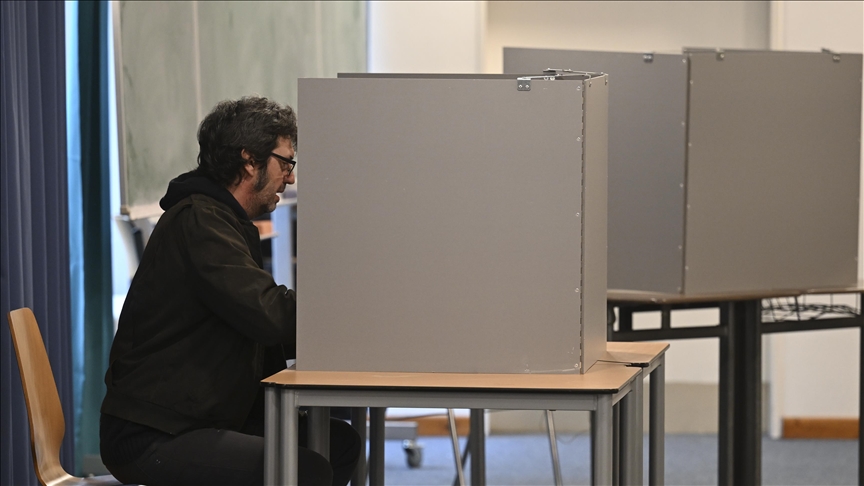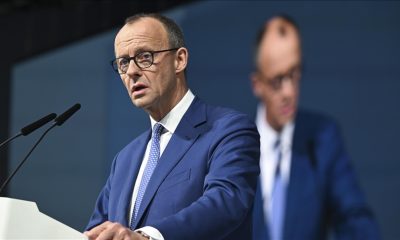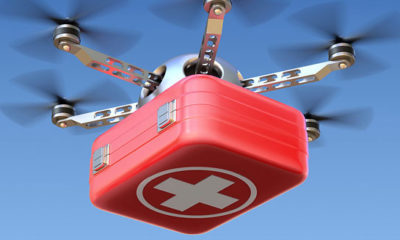World
Germany Elections: Conservative Leader Friedrich Merz’s CDU/CSU In Early Lead
Opposition leader Friedrich Merz’s Christian Democrats hold commanding lead against Olaf Scholz’s Social Democrats in latest opinion polls

The voter turnout reached 52% by early afternoon as Germans headed to the polls Sunday in a nationwide election to elect a new parliament and government — a landmark vote that could reshape the country’s political landscape.
Polling stations opened at 8 a.m. (0700GMT) at nearly 90,000 locations across the country and will close at 6 p.m. (1700GMT).
More than 59 million German citizens are eligible to vote in the elections, including 2.3 million first-time voters, according to official data. The electorate leans heavily on the older side, with 42% of voters aged 60 or above, compared to just 13% under 30.
Over 7 million eligible voters have immigrant backgrounds, including more than 1 million German citizens of Turkish origin.
While some Germans have already submitted their mail-in ballots, thousands of citizens living abroad have reported on social media that their postal voting documents have not arrived in time.
The voter turnout reached 52% by early afternoon, higher than in the 2021 election. Four years ago, the turnout was 36.5% in the early afternoon, though this lower figure was largely attributed to the coronavirus pandemic and voters’ preference for postal voting.
Conservative Merz seen as favorite
Opposition leader Friedrich Merz’s Christian Democrats (CDU/CSU) are favored to win the election, though they are not expected to gain enough seats to form a government on their own.
The latest INSA polling data shows the center-right CDU/CSU alliance commanding 29.5% of voter support, maintaining more than 14-point lead over Chancellor Olaf Scholz’s struggling Social Democratic Party (SPD).
The far-right Alternative for Germany (AfD) has reached 21% in the latest poll, setting up for its strongest federal election performance yet and positioning itself as the second-most powerful political force in the country.
A survey released Thursday showed that nearly 27% of voters remained undecided just days before the election, unsure whether to vote or which party to support.
Germany’s complex election system
Germany’s chancellor is elected indirectly, with voters choosing new parliament members, who then pick the new chancellor with a vote among themselves.
If the winning party secures a majority in parliament, or manages to build a coalition government with an absolute majority, its candidate becomes the country’s next chancellor.
Germany uses a mixed voting system where each citizen casts two ballots. With their first vote, they choose a specific candidate to represent their local district. Their second vote supports a political party, determining the party’s total representation in the 630-seat parliament.
Coalition options remain uncertain
Recent opinion polls show no party is expected to win an absolute majority, indicating that complex negotiations to form a coalition government will be necessary.
Analysts widely anticipated a coalition between the Christian Democrats and Social Democrats as the most likely outcome, though with many undecided voters and Germany’s complex electoral system, this projection remains uncertain.
Six parties are currently polling well above the 5% threshold required to enter the Bundestag: the CDU/CSU alliance (29.5%), the far-right AfD (21%), SPD (15%), Greens (12.5%), and socialist Die Linke (7.5%). Recent polling indicates that the left-populist BSW party may barely reach the 5% threshold.
The anti-immigrant AfD party has no viable path to power, as all other parties—including frontrunner chancellor candidate Friedrich Merz’s Christian Democrats—have ruled out forming a coalition with them.
If smaller parties like the liberal FDP and left-populist BSW reach the 5% threshold for parliamentary representation, conservative leader Merz would need to build a three-party coalition to secure a majority—a scenario that could lead to prolonged negotiations and political uncertainty.
Chancellor Scholz’s three-party coalition government—comprising the SPD, Greens, and FDP—collapsed in November due to disagreements over the budget, welfare programs, climate targets, and whether to take on new debt for investments. Instead of leading a minority government, Scholz opted for snap elections, saying Germany requires a strong and stable government to tackle its pressing challenges.
(Anadolu Agency)
Kenya Insights allows guest blogging, if you want to be published on Kenya’s most authoritative and accurate blog, have an expose, news TIPS, story angles, human interest stories, drop us an email on [email protected] or via Telegram
-

 News2 weeks ago
News2 weeks agoTHE FIRM IN THE DOCK: How Kaplan and Stratton Became the Most Scrutinised Law Firm in Kenya
-

 Economy2 weeks ago
Economy2 weeks agoIran Demands Arrest, Prosecution Of Kenya’s Cup of Joe Director Director Over Sh2.6 Billion Tea Fraud
-

 Grapevine1 week ago
Grapevine1 week agoA UN Director Based in Nairobi Was Deep in an Intimate Friendship With Epstein — He Even Sent Her a Sex Toy
-

 Business2 weeks ago
Business2 weeks agoKPC IPO Set To Flop Ahead Of Deadline, Here’s The Experts’ Take
-

 Politics2 weeks ago
Politics2 weeks agoPresident Ruto and Uhuru Reportedly Gets In A Heated Argument In A Closed-Door Meeting With Ethiopian PM Abiy Ahmed
-

 Investigations1 week ago
Investigations1 week agoHow Mexico Drug Lord’s Girlfriend Gave Him Away
-

 Business2 weeks ago
Business2 weeks agoSafaricom Faces Avalanche of Lawsuits Over Data Privacy as Acquitted Student Demands Sh200mn Compensation in 48 Hours
-

 Investigations2 weeks ago
Investigations2 weeks agoKenya’s DCI Opens Probe on Russian Man Who Secretly Filmed Sex Escapades With Women — But There’s a Slim Chance They’ll Ever Get Him





























